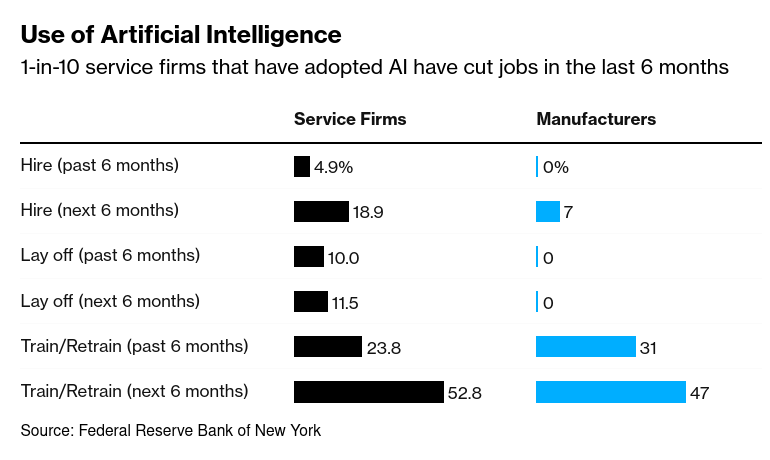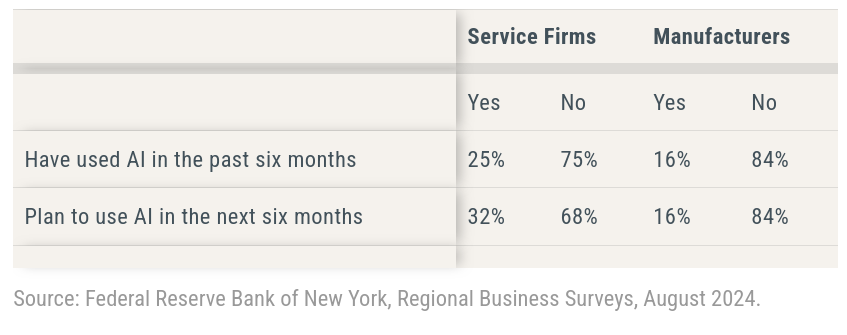September 5, 2024
AI and jobs
The lack of coherent analytical tools within the mainstream economics profession to study and understand automation and "AI" implementation results in ongoing confusion.
In the press this morning, there are more questions about "hype", "bubbles", and "highly disruptive scenarios" across the IMF, major banks, and investors because of the decline in stock value of Nvidia, problems at Intel, and strain on the "data centres" to handle the growing demand for AI.
At the same time these same institutions are questioning why all this "AI" is not resulting in the massive job losses (and increased profits) that were supposed to happen.
The issue is that mainstream economics is based on measuring numbers in the current system, not taking a look at the underlying factors driving business decisions.
AI was never going to result in a sudden and unexpected bottom falling out of job market for one specific reason: Automation is not free.
Some business economists have started to figure this out, stating that "much of what US industrial giants produce isn’t worth the added cost and complexity" (BN). However, they have gone too far the other way. The quote above is from a review that looked at why pool-pump makers are not using AI. Well, of course not.
There are other hand-wringing analyses such as reports from the Federal Reserve of New York showing that "only" one in ten firms are laying off workers because of AI. The rest "plan" on retraining workers into other roles.

These reports almost all get there, but miss the point. We are not in the stage where there is any impact because it takes time to figure out how to replace workers with new technology. It takes time for firms to figure out if they can use it, how it can be used, the actual cost of implementation, and the effect on product value and output.
I think the fact that a tenth of firms have laid-off workers due to AI implementation is surprisingly high. These are first movers in the areas that are most easily upgraded:
The most widely cited use of the technology was for marketing, advertising, business analytics and customer service, according to the survey.
Of course, those who plan on using AI/automation to increase output have not landed yet:

Also, these studies do not track the competition from new firms implementing AI supported automation, while comparing the number of workers required to produce the products that their older competitors need.
In the end, the impact of automation on the job market is going to be felt either through the replacement of older firms with newer, more automated firms, or through older firms taking on more debt to compete.
That race is going to speed up as interest rates come down, and as soon as one competitor figures out each part of the process to automate.
These processes would be much easier to understand using classical tools such as the "Organic Composition of Capital", or if mainstream economics bothered to ask actual businesses what they were doing.
In the private sector in Canada, we are already seeing the impact of automation. We are already experiencing labour disruptions based on concerns over automation and job loss. From supply chains to drones, to technology in vehicles, to monitoring of workers, to automation of management and discipline, there are many ways that firms have been ramping up the use of AI in easy-to-deploy areas that reduce the labour of management.
It is important for the left to look through the fog of poor reporting and popular academic analysis when it comes to the implementation of automation and new applications using AI. We must respond to the problems facing workers already, and plan for the real issues when it comes to the implementation of software and hardware that reduces skills and affects the work environment. We also have to push hard on legislators to see the real threats, and not the ones touted by the Musks of the world of some far-off unlikely scenarios.
Workers need increased capacity in regulatory bodies to deal with issues resulting from new technologies, state intervention to ensure safe implementation, and rules around replacing workers simply to increase profit rates if the impact is lower safety standards.
The real threat to workers is from the same old processes of capitalism, constantly applied in new malicious ways. The answer to this threat is the same process as before, while integrating these new tools into our struggle.
While doing this, we must also raise the question of whether capitalism is at all capable of implementing this kind of automation in a responsible way. The answer is increasingly obvious to workers.
France, home of the liberal dictator named Macron
President Emmanuel Macron has named the EU’s former Brexit negotiator Michel Barnier as France’s next prime minister in a bid to break a post-election political stalemate.
The Élysée Palace said on Thursday that Barnier had been “tasked with forming a unifying government to serve the country and the French”.
Barnier, 73, is a veteran of France’s conservative party, Les Républicains (LR). (FT)
Macron has gone for a coalition of the far right to cohabitate with. Thank you, French public for "saving the Republic"; we will just hand it to them anyway.